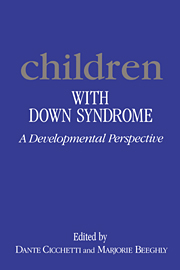Book contents
- Frontmatter
- Contents
- List of contributors
- Preface
- 1 Applying the developmental perspective to individuals with Down syndrome
- 2 An organizational approach to the study of Down syndrome: contributions to an integrative theory of development
- 3 Temperament and Down syndrome
- 4 Interactions between parents and their infants with Down syndrome
- 5 Attention, memory, and perception in infants with Down syndrome: a review and commentary
- 6 Sensorimotor development of infants with Down syndrome
- 7 The growth of self-monitoring among young children with Down syndrome
- 8 Early conceptual development of children with Down syndrome
- 9 Language abilities in children with Down syndrome: evidence for a specific syntactic delay
- 10 Beyond sensorimotor functioning: early communicative and play development of children with Down syndrome
- 11 Peer relations of children with Down syndrome
- 12 Families of children with Down syndrome: ecological contexts and characteristics
- 13 Early intervention from a developmental perspective
- Name index
- Subject index
6 - Sensorimotor development of infants with Down syndrome
Published online by Cambridge University Press: 02 November 2009
- Frontmatter
- Contents
- List of contributors
- Preface
- 1 Applying the developmental perspective to individuals with Down syndrome
- 2 An organizational approach to the study of Down syndrome: contributions to an integrative theory of development
- 3 Temperament and Down syndrome
- 4 Interactions between parents and their infants with Down syndrome
- 5 Attention, memory, and perception in infants with Down syndrome: a review and commentary
- 6 Sensorimotor development of infants with Down syndrome
- 7 The growth of self-monitoring among young children with Down syndrome
- 8 Early conceptual development of children with Down syndrome
- 9 Language abilities in children with Down syndrome: evidence for a specific syntactic delay
- 10 Beyond sensorimotor functioning: early communicative and play development of children with Down syndrome
- 11 Peer relations of children with Down syndrome
- 12 Families of children with Down syndrome: ecological contexts and characteristics
- 13 Early intervention from a developmental perspective
- Name index
- Subject index
Summary
The purpose of this chapter is to review and synthesize available data regarding the sensorimotor development of infants with Down syndrome. The term sensorimotor development refers to qualitative changes in the psychological functioning of infants occurring during the period from birth to the beginnings of symbolic and representational thought. Qualitative changes in psychological functioning reflect the infant's capacity to acquire, store, and use information about the social and nonsocial world. The study of the sensorimotor capabilities of infants has its roots in Baldwin's (1895, 1897) psychobiological model of child development; reached the forefront of psychology with Piaget's (1936/1952, 1937/1954, 1945/1951) publication of his trilogy on infant intelligence; and has more recently been the focus of attention, most notably reflected in the work of McCall (1979) and Uzgiris (1983).
The notions of sequence, stage, and structure are central to the study of psychological (cognitive) functioning in general (Flavell, 1982a, 1982b) and sensorimotor development in particular (Uzgiris, 1987). The term sequence refers to the constant and invariant order of acquisition of progressively more complex cognitive competencies. The term stage refers to the distinct forms of behavior that are manifested at different ages or periods of development. The term structure refers to the manner in which different manifestations of behavior bear some developmental (stagelike) relationship to one another, and share some sort of common mediator or denominator.
The sensorimotor period is generally considered to consist of six progressively more complex types of psychological sets of competencies (Piaget, 1952). Each level in this sequence is defined by classes of behavior that exemplify distinct stages of development. Piaget (1952) describes these stages in terms of the various types of adaptations the infant is capable of making in response to different environmental demands.
- Type
- Chapter
- Information
- Children with Down SyndromeA Developmental Perspective, pp. 180 - 230Publisher: Cambridge University PressPrint publication year: 1990
- 26
- Cited by



